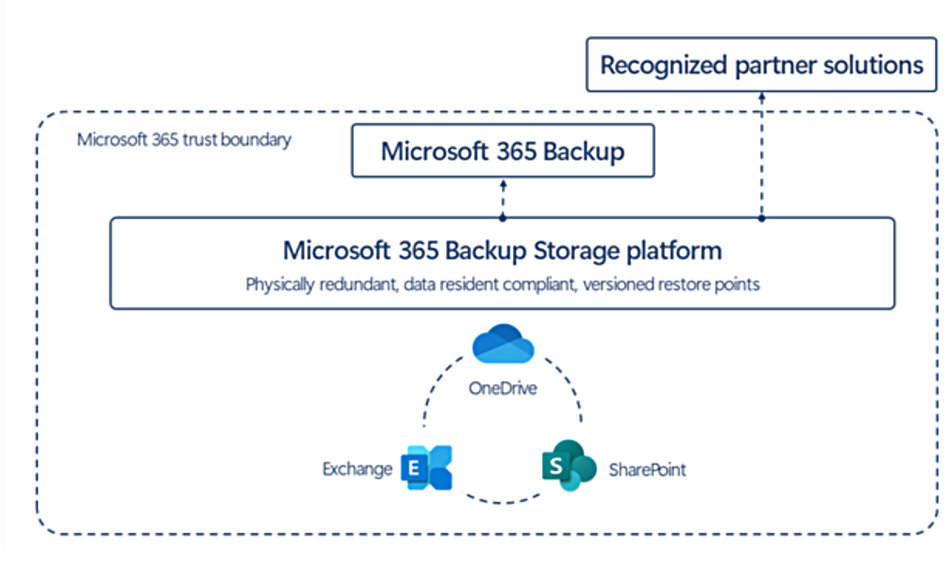Microsoft has launched Microsoft 365 Backup and Microsoft 365 Backup Storage, introducing cloud data backup directly on its platform, which is also accessible for third-party use.
Several have jumped aboard at once – AvePoint, Cohesity, Commvault, Keepit, Rubrik, Veeam, and Veritas – and will be keeping all or some of their Microsoft 365 customer backup data in Azure. Microsoft software engineers have probably done clever things with snapshots and metadata to speed things up.

Microsoft 365 Backup provides backup and recovery for active data to maintain business continuity “at speeds orders of magnitude faster than with traditional migration-based backup methodologies.” It has “ultra-high-speed recovery of your OneDrive, SharePoint, and Exchange data.” Microsoft says: “Many customers will see average speeds for mass restores that are 20 times faster than traditional means of backing up and restoring large volumes of Microsoft 365 data.”
We haven’t seen any benchmark test numbers and Microsoft bases its claim on internal research. However, if a service like Exchange Online or Teams is based in Azure, then backing it up within Azure is intuitively going to be faster than copying the data outside Azure.
Microsoft 365 Backup Storage powers the Microsoft 365 Backup offering. It gives third-party backup developers, using the Microsoft 365 Backup Storage APIs, a way to provide the same features of Microsoft 365 Backup through their own integrated application.
Commvault
Commvault Cloud is built on Azure, and Commvault has announced Microsoft 365 Backup Storage as an integrated component of Commvault Cloud Backup and Recovery for Microsoft 365. It delivers cyber resilience and recovery across Microsoft 365 workloads. Native integration provides unified control with single-pane-of-glass monitoring and administration via Commvault Cloud.
Commvault’s Microsoft 365 protection capabilities across Exchange Online, Teams, OneDrive, and SharePoint include selectable and configurable extended retention, granular recovery, and self-restore options.

Tirthankar Chatterjee, CTO Hyperscalers at Commvault, stated: “We are building on our 27-plus years of co-development and co-engineering with this integrated solution that helps customers achieve the highest level of cyber resilience and threat readiness, along with the ability to greatly improve recovery time to specific Microsoft 365 workloads.”
Zach Rosenfield, Microsoft’s Partner Director of PM, Collaborative Apps and Platforms, stated: “With this integration, Commvault has taken a major step in helping our joint customers keep their business running with fast operational recovery from cyberattacks.”
Commvault Cloud Backup and Recovery for Microsoft 365 will be available through the Microsoft Azure Marketplace later this quarter.
Keepit
SaaS backup provider Keepit is, on the face of it, an unlikely Microsoft Backup Storage partner. The Keepit service offers fast, immutable, independent, always-online storage that protects Microsoft 365, Entra ID, Google Workspace, Salesforce, and more. It stores the backup data in its own privately operated datacenters in the USA, Canada, UK, Germany, Denmark, and Australia.

Keepit’s Paul Robichaux, Senior Director of Product Management, writes in a blog: “We are adding support for Microsoft 365 Backup Storage so that you can flexibly choose to add rapid-restore protection for your most critical Microsoft 365 assets.”
“Microsoft has invested decades of engineering experience and knowledge into the Microsoft 365, Entra ID, Power Platform, and Dynamics 365 platforms. Because they have complete control over and visibility into every aspect of those platforms, their first-party backup solution delivers some great technical capabilities, including high restore speeds at large scale and great data fidelity. The combination of database level backup for SharePoint and OneDrive and copy-on-write backup for Exchange Online gives customers a powerful new tool for large-scale recovery. No other vendor can provide the same direct capabilities because none of us are “inside the blue curtain.” We just do not have the same access to the platform that Microsoft does.”
While Microsoft has unique access to their platform, what Keepit says it contributes is unique separation of environments and guaranteed access to data: “With data stored in the independent Keepit cloud, customers retain access even if they lose access to Microsoft.”
He says that the SaaS backup discussion is changing with the increased recognition that the customer is responsible for ensuring the security and availability of their own SaaS control plane and application data in a world that is increasingly insecure. The SaaS vendor can do a lot to help, but ultimately it’s the customer’s responsibility: “They ignore that at their peril.”
“Keepit protects the full range of critical objects, including conditional access policies, application registrations, users, mailboxes, SharePoint sites, Teams channels, Microsoft 365 Groups, CRM data, and more; Microsoft 365 Backup Storage adds rapid-restore protection for the object types they protect.”
“For customers, the perfect backup setup for Microsoft 365 will be this: A full, immutable, logically and physically separate backup of all of Microsoft 365 and Entra ID in Keepit, with extra restore capabilities of critical data sets in Microsoft 365 Backup Storage. In this setup, customers can keep costs under control, and have guaranteed access to all data, in the event of losing access to Microsoft tenants or administrator credentials.”
Keepit’s integration with Microsoft 365 Backup Storage is currently in private preview and it’s rolling this feature out to eligible customers soon. The Keepit Microsoft 365 roadmap includes:
- Keepit will suggest which data items might benefit from rapid restore protection, using data about activity and cost to intelligently balance recovery time, coverage, and cost
- When a user requests a restore, Keepit will know exactly where to retrieve the data from to get it back both completely and quickly
- Seamless integrated restore across both storage platforms, allowing one-click restore of Entra ID alongside Microsoft 365 data
- Automatic migration of data between platforms to provide cost-effective long-term data preservation giving you the right protection for the different types of data you have at the right cost
- Integrated auditing and management to help define, monitor, and enforce backup and compliance policie
Veeam
Veeam Data Cloud is built on Azure and provides backup-as-a-service (BaaS) for Microsoft 365, with more than 21 million users protected. The company says it’s a launch partner for Microsoft 365 Backup Storage and Veeam Data Cloud for Microsoft 365 uses Microsoft’s 365 Backup Storage offering. This new Microsoft backup technology is embedded inside Veeam’s backup service for Microsoft 365.
Veeam Data Cloud for Microsoft 365 protect and restore hundreds of TBs of data or 10,000-plus objects. It “offers bulk restores at scale, ensuring increased resilience to ransomware or malware attacks and minimizing downtime.”

John Jester, Chief Revenue Officer (CRO) at Veeam, said in a statement: “This new release combines the benefits of Veeam’s industry-leading technology – in both data protection and ransomware recovery – with the latest Microsoft 365 data resilience capabilities introduced by Microsoft, and extends them to even more customers using Microsoft 365. In addition, we’re making great progress in our joint innovation bringing the power and insights of Microsoft Copilot to the Veeam product family.”
Veeam has a new five-year strategic partnership with Microsoft and is developing future services integrating Microsoft Copilot and Azure AI services to enhance data protection for Microsoft 365 and Azure. These “will simplify operations [and] automate administrative tasks.”
Veeam Data Cloud for Microsoft 365 with Microsoft 365 Backup Storage will be available in early August. Three packaging options (Express, Flex, and Premium) are available to accommodate Veeam and Microsoft customers. Get more information here.
***
Microsoft 365 Backup is offered through the Microsoft 365 admin center and is sold as a standalone pay-as-you-go (PAYGO) solution with no additional license requirements. There is more information available in a Microsoft blog.
The Cohesity, Rubrik, and Veritas offerings with integrated Microsoft 365 Backup Storage will be coming soon.








